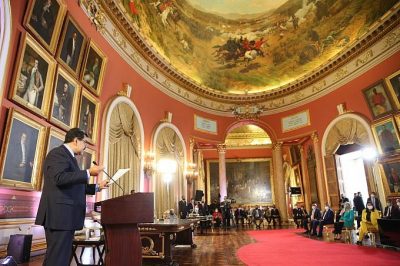Venezuela Announces New Fuel Scheme as Iranian Gasoline Arrives
The Maduro government also presented a new "anti-blockade" law.

A second Iranian convoy of tankers is arriving in Venezuela this week with over 800,000 barrels of gasoline.
Forest, Faxon and Fortune ships will be discharging the fuel shipments in the El Palito and Paraguana refinery ports over the coming days at a moment when the nation’s gasoline supply finds itself in a critical state.
Last May, a flotilla of five Iranian vessels made a first delivery of 1.5 million barrels of gasoline and fuel additives, as well as parts for refineries.
Another shipment destined for Venezuela with an estimated 1.1 million barrels was seized in international waters in August in a US civil forfeiture case. The fuel will allegedly be auctioned and the funds destined to the US Victims of State Sponsored Terrorism Fund.
With US sanctions targeting the Caribbean country’s oil industry as well as crude-for-fuel swap deals, fuel shortages have become widespread in recent weeks throughout the country. Caracas has turned to Tehran for assistance with both fuel cargoes and restarting the country’s refining industry. The El Palito and Cardon refineries are currently producing 55,000 barrels per day (bpd), well below maximum capacity and short of meeting demand.
The new Iranian fuel shipment saw the Venezuelan government unveil a new fuel rationing system based on license plate numbers which will begin next Monday. President Maduro announced that new cargoes have been secured but that the country needs to meet its gasoline and diesel demand with domestic production.
Fuel shortages, as well as a deterioration of public services, have generated protests in a host of states in recent days. Local authorities deployed riot police, with an unconfirmed number of arrests thus far.
On Tuesday, the Maduro government announced a new initiative to tackle the effects of US sanctions by submitting an “anti-blockade” bill at the National Constituent Assembly. The legislation is claimed to provide the Venezuelan state with new institutional and legal capacities to face the US blockade.
In his speech presenting the bill, Maduro highlighted the harmful effects of the US Treasury measures on the oil industry and the difficulties they created in sustaining social programs.
“In five years, the blockade cut off financing to the country, preventing the state from having the foreign exchange to purchase food, medicine, supplies and essential raw materials for economic activity,” he emphasized.
Maduro explained that the new law will look to stimulate economic activity by creating better and more flexible conditions for private sector investment. This will reportedly entail creating labor and tax benefits for businesses.
*
Note to readers: please click the share buttons above or below. Forward this article to your email lists. Crosspost on your blog site, internet forums. etc.
Featured image: Venezuelan President Nicolas Maduro presented a new “anti-blockade” law before the National Constituent Assembly. (Prensa Presidencial)

